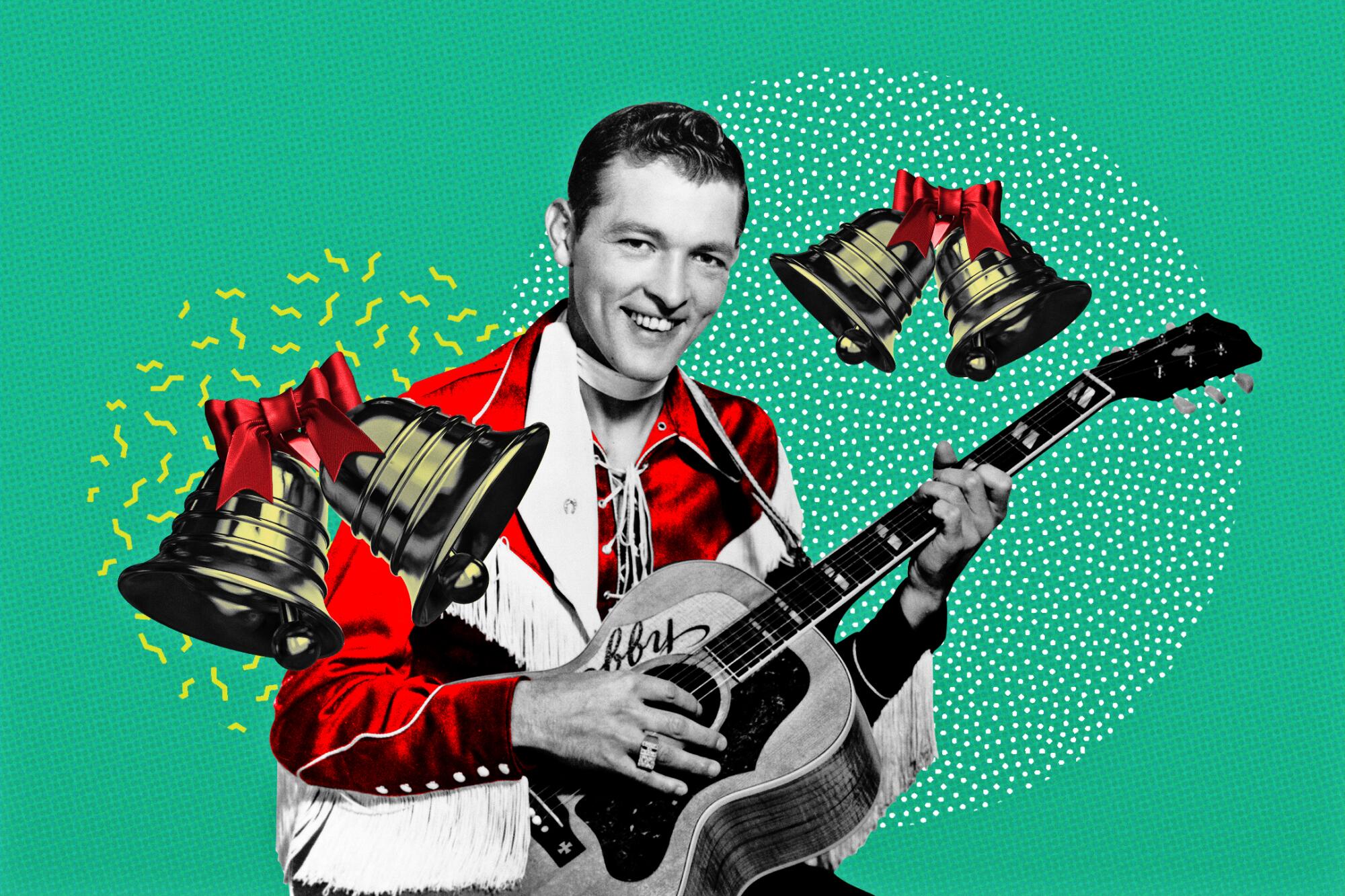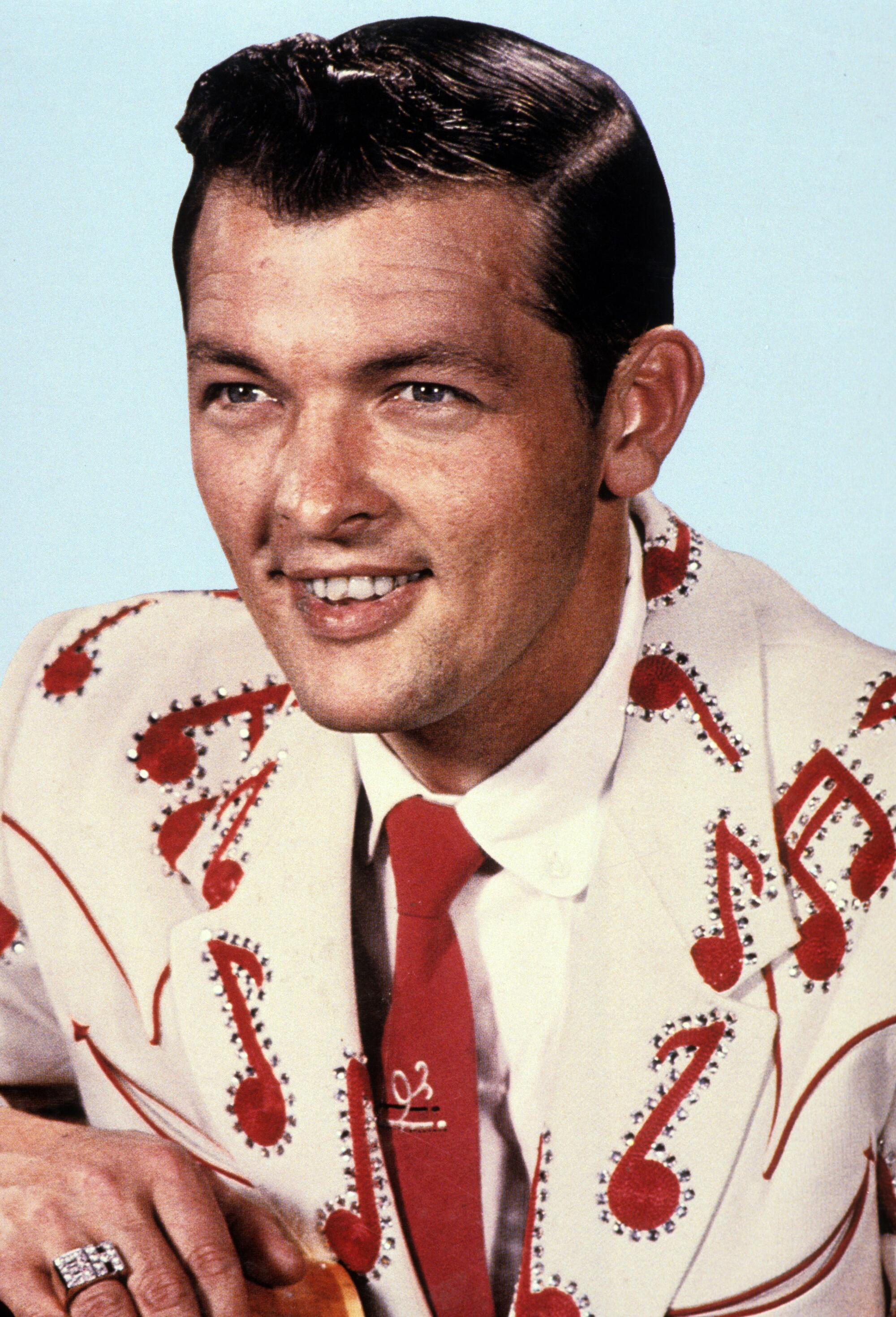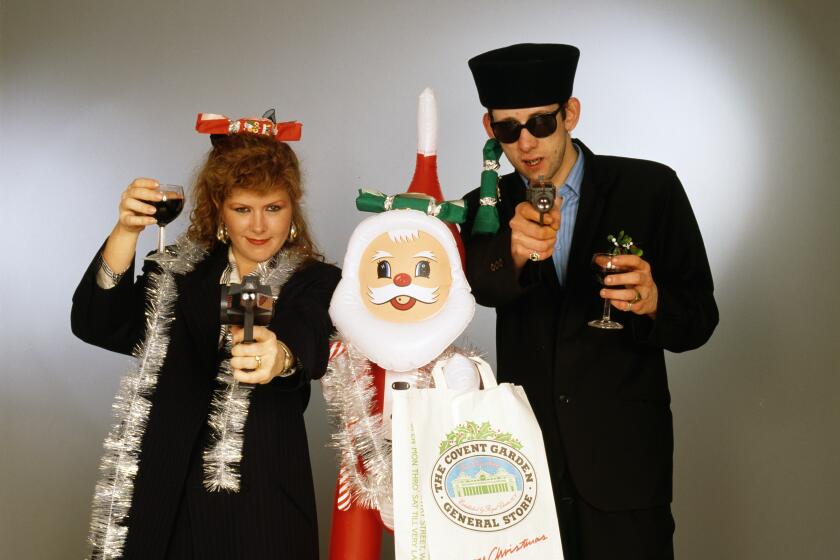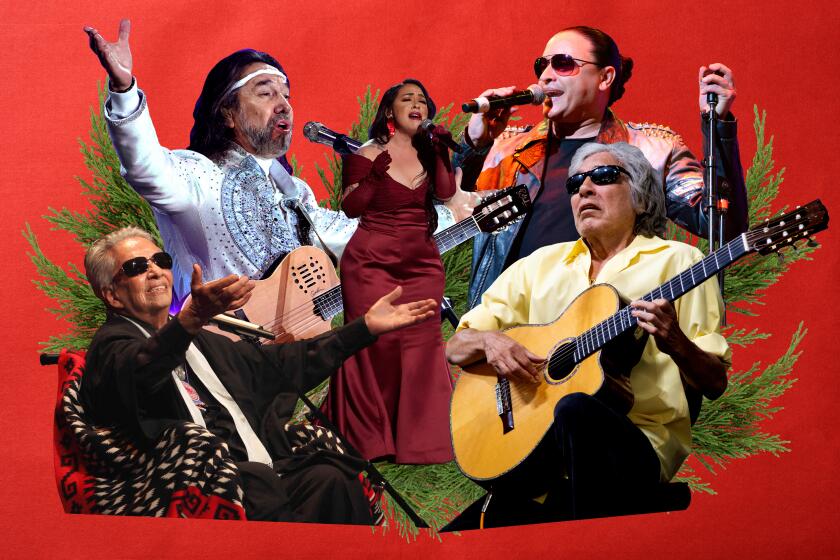
Bobby Helms couldn’t have asked for a better first year in the music business.
Blessed with a soft nasal twang that bore a resemblance to Webb Pierce, one of the reigning kings of country music in the 1950s, Helms caught the attention of Ernest Tubb, who invited the Indiana native to perform on his popular radio show “The Midnight Jamboree.” His performance soon secured the 23-year-old singer a contract with Decca Records. “Fraulein,” the second single he released for the label, shot straight to No. 1 on Billboard’s Country Songs chart early in 1957. Syrupy strings and the Anita Kerr Singers helped the swooning follow-up “My Special Angel” cross over into the pop Top 10. The time was ripe for Helms to rush out a seasonal single just in time for Christmas.
Paul Cohen, a Decca executive who doubled as its house producer in Nashville, had a song in mind for Helms: “Jingle Bell Hop,” a tune written by Joe Beal and Jim Boothe, a pair of 50-something composers with backgrounds in public relations and advertising. Somebody in the studio hauled out a chord organ and sang the song for Helms. “It was terrible, according to Bobby,” says John Kleiman, who managed the singer during the last decade of his life and currently owns licensing rights for Helms, who died from emphysema in 1997. “He said the electric organ sounded bad and the guy who was singing was terrible.”
Instead of rejecting the song outright, Helms teamed with Hank Garland — a hotshot Nashville studio guitarist hired for the session — and reworked it, adding a bridge, altering the melody and changing the words, making sure to avoid any spiritual connotations. “Bobby came from a very religious family,” explains Kleiman. “He didn’t want to have rock ‘n’ roll associated with Christmas because he knew his mother wouldn’t like it. And that’s one reason Christmas is not mentioned in the song.”
Helms and Garland transformed “Jingle Bell Hop” into “Jingle Bell Rock,” a catchy little rock ‘n’ roll tune released at a time the music was still young enough to seem a fad. The singer cut the record during an early-morning session designed to accommodate his busy touring schedule, then returned to the road. “He never thought he had something special,” says Kleiman. “He thought this was just another Christmas song.”

Far from being “just another Christmas song,” “Jingle Bell Rock” turned out to be one of the defining holiday songs of the rock ‘n’ roll era, as instantly recognizable today as Bing Crosby’s “White Christmas” or Nat “King” Cole’s “The Christmas Song (Merry Christmas to You).” Sixty-five years after its initial release, it’s still gaining popularity and profitability with each passing year.
“Jingle Bell Rock” has been streamed over 635 million times on Spotify, and currently sits at No. 3 on the Billboard Hot 100, its highest-ever chart placement. Daryl Hall & John Oates revived the song at the peak of their stardom, covering it with a wink in 1983 and filming a cheerfully camp video that was in regular rotation on MTV through the 1980s. The floodgates for “Jingle Bell Rock” opened up in 1987, when “Lethal Weapon” became the first film to feature the Helms original in a contemporary setting. Since then, artists ranging from George Strait to Kelly Clarkson to the cast of “Glee” have recorded versions. It’s rare that a year passes without “Jingle Bell Rock” popping up on the soundtrack for a movie or television show.
Tired of chestnuts roasting on an open fire? Here, 50 new Christmas classics — from pop to hip-hop to folk to glam-rock — from the past half-century.
Generation after generation has grown up with “Jingle Bell Rock” playing in the background, the years of ambient repetition cementing its status as a holiday classic. It’s also now part of an annual tradition in which a bounty of Christmas records reappear on the charts every December. Currently, 15 of the songs on Spotify’s Top 50 in the USA are holiday songs, while half of Billboard’s Top 40 are Christmas tunes. Billboard chart historian Chris Molanphy, who hosts the “Hit Parade” podcast for Slate, explains, “There’s this weird consistency where we’ve decided on the new Christmas canon and Bobby Helms is part of that core. Alongside Mariah Carey’s ‘All I Want for Christmas Is You’ and Brenda Lee’s ‘Rockin’ Around the Christmas Tree,’ ‘Jingle Bell Rock’ is in the top three.”
Molanphy says that the recent popularity of “Jingle Bell Rock” doesn’t mark a resurgence so much as a reckoning driven by the rise of streaming music on demand. “It’s only when we have wide acceptance of streaming and we are now counting every time you hit play on Mariah Carey, every time you hit play on Bobby Helms, that we realize, ‘Oh my God, these records are huge.’ And they’re bigger than we even realized. What’s interesting, too, over the course of the decade of the streaming era, is that they get a little bit bigger every year. Not because Christmas records are bigger in 2022 than they were in 2013, but because streaming keeps increasing in penetration.”
The numbers bear this out. According to Luminate, the company that generates the data that powers the Billboard charts, “Jingle Bell Rock” has garnered more on-demand streaming plays every year since 2012. The single remains a staple on radio, too, racking up over 40,000 spins each year since 2018 — an increase from the 30,000 spins per year early in the 2010s.

Enduring though it may be, “Jingle Bell Rock” is a product of its time, a cheerful piece of Christmas commerce made with only one intention: to sell records during the holiday season of 1957. Helms knocked it out so swiftly, neither he nor Garland attempted to claim credit for their songwriting contributions.
Helms often told the story of the “Jingle Bell Rock” session, recounting it with such detail that, Kleiman says, “I have no doubt that Bobby wrote the majority of the song. I asked him, ‘If you wrote this, why didn’t you confront Decca Records at that time?’ He said he’s not gonna get into it with the record label because if you got into it with them, they would stop putting your music out.”
Helms’ fear of reprisal from the record company was probably justified. During the 1950s, the music business was rife with shady deals. Labels were loath to pay out royalties, and songwriting credits were often awarded as payment to loyal colleagues, as when Chuck Berry’s debut single “Maybellene” featured a Cleveland disc jockey credited as a co-author.
From Puerto Rican salsa to Bronx bachata to Mexican balladry — and something of a surprise at No. 1 — here’s the perfect playlist for your holiday season.
A seasonal perennial like “Jingle Bell Rock” generates no small amount of money on a yearly basis. The late songwriters Beal and Boothe get paid whenever the composition is streamed or played on the radio, whether it’s the original hit version or a subsequent cover. For instance, when you stream Lindsay Lohan’s new version of “Jingle Bell Rock,” from the Netflix movie “Falling for Christmas,” the credited songwriters get paid but Helms does not. Recording artists only derive royalties when their own version is either sold or streamed. Furthermore, in a longstanding legal quirk, terrestrial radio airplay generates royalties only for songwriters, not for recording artists.

Helms received performance royalties from the single — Kleiman says “Bobby was a thankful man” — but he and Garland probably missed out on a sizable payday for their songwriting. Kleiman says he’d have no way of guessing the monetary amount Helms could’ve made for writing the holiday standard, but, he posits, “I’m sure it’s in the millions.”
It’s far from an uncommon story. Susan Genco, the co-president of the Azoff Co. and a founder of the artist advocacy group Music Artists Coalition, sees this scenario repeating itself today. Recently, Genco attempted to convince a manager of a major artist that if his client’s portion of the songwriting on a new song wasn’t properly accounted for prior to release, they would be forfeiting a steady, reliable avenue of income. The manager and artist opted to release the song anyway. “It was more important for the record to come out, to explode on streaming,” she says.
Genco argues that publishing rights “are these people’s annuities. These are pensions and you want to get it right at the beginning so that they have it. Rightfully, it belongs to them.”
Helms received regular performance royalties from “Jingle Bell Rock,” and he also was able to tour off its success until his last days. Hank Garland wasn’t so lucky.
Right after the release of “Jingle Bell Rock,” he became Elvis Presley’s regular guitarist in the studio, appearing on such hits as “Stuck on You,” “Little Sister” and “(Marie’s the Name) His Latest Flame.” He continued to play sessions in Nashville, including an appearance on Lee’s “Rockin’ Around the Christmas Tree,” and recorded the album “Jazz Winds From a New Direction” in 1960. All his success came to a halt when he suffered a debilitating car crash in 1961. After the accident, Garland could no longer play guitar and the royalties he made from his work as a session musician were meager. He spent his last years under the care of his younger brother Billy, who helped spearhead a 2003 lawsuit against Warner-Chappell Music, the publisher that wound up owning “Jingle Bell Rock.” Billy filed the lawsuit himself. Months before Hank Garland’s death in December 2004, a federal judge dismissed all counts except one. Garland’s tragic story was told in “Crazy,” a 2008 film starring country singer Waylon Payne as Garland and Ali Larter as his wife.
Billy Garland died in 2021.

With Helms, Hank Garland, Beal and Boothe all long dead, it’s difficult to definitively determine the song’s authorship, especially as very little hard evidence survived: There is no songwriting demo or studio paperwork to support either side. “Jingle Bell Rock” does sound more like subsequent songs credited to either Helms or Garland than it does “Unsuspecting Heart,” an old-fashioned, pre-rock pop number released by Terri Stevens in 1955 that bears Beal’s name as a co-writer (a search for recordings of other Boothe-penned songs turned up empty).
It also could be argued that the appeal of “Jingle Bell Rock” lies as much with the record as the song itself, and that success can be entirely credited to Helms and Garland: The singer has a warm, jovial delivery that matches the guitarist’s jaunty, jazzy licks. As Molanphy says, “Now that we have streaming data, we know that people go back to the standards every year, and ‘Jingle Bell Rock’ is a standard.”
Or as Kleiman puts it, “As long as we celebrate Christmas, we’ll play ‘Jingle Bell Rock.’”
More to Read
The biggest entertainment stories
Get our big stories about Hollywood, film, television, music, arts, culture and more right in your inbox as soon as they publish.
You may occasionally receive promotional content from the Los Angeles Times.












